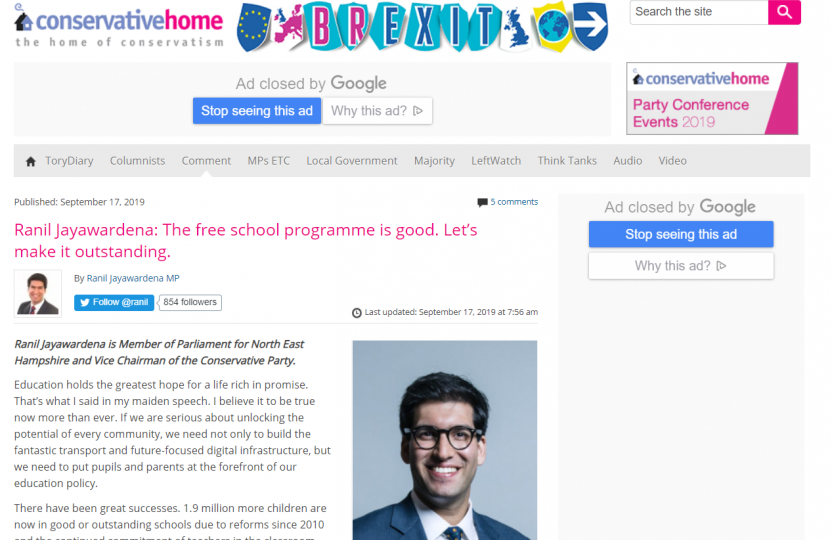
The following article by Ranil Jayawardena MP appeared in Conservative Home | Comment on 17th September 2019.
Education holds the greatest hope for a life rich in promise. That’s what I said in my maiden speech. I believe it to be true now more than ever. If we are serious about unlocking the potential of every community, we need not only to build the fantastic transport and future-focused digital infrastructure, but we need to put pupils and parents at the forefront of our education policy.
There have been great successes. 1.9 million more children are now in good or outstanding schools due to reforms since 2010 and the continued commitment of teachers in the classroom. Boris Johnson has set out that we will ‘level up’ funding so that schools in every corner of the country get a boost. And it is right that we think about the next steps.
Every year, we get more evidence of the growing success of David Cameron’s free schools policy. But seeing these great results comes with a tinge of frustration that so few have been approved recently. That’s why I was delighted with Boris’ announcement that there will be a new wave of free schools, changing the lives of countless pupils.
We know how well these schools achieve – they outperform other school types at every level, and are more likely to be rated Outstanding by Ofsted than any other school. Last month, GCSE results day brought these triumphs further to life, showing more of the transformational impact these schools have made.
Schools like Cobham Free School, where 78 per cent of the first cohort of students achieved Grades 9-4 in their English and maths GCSEs. At the East London Science School, more than a quarter of all grades were 7 or above, significantly above the national average.
Kings College London Mathematics School retained their spot as the highest performing state school at A-level with 91 per cent of all grades achieving A* or A. The specialist maths school offers talented young mathematicians opportunities that would previously have been denied to them. Alongside Kings, at London Academy of Excellence in Newham an incredible 93% of all grades by students were A*-B, resulting in an unprecedented 22 students securing places at Oxford and Cambridge.
It would be remiss of me not to reference Michaela Community School, too. The school has attracted huge amounts of criticism over the years, but proved its doubters wrong in stunning fashion last month. Across every subject, more than half of exams were graded 7 or higher, while nearly a quarter of students achieved grades 9-7. Overall, the school has an estimated Progress 8 score of 1.5, making it likely to be in the top ten highest performers in the country.
This makes it all the more frustrating that there is no guarantee these schools would get approved today. The criteria for new schools to open have been squeezed over the past few years so much so that new parent and community groups are at risk of becoming extinct. While I do not agree with the critics who suggest that the free school programme is now merely a vehicle for academy trusts to grow, the argument is too easily made.
I know first-hand that it is still possible for community groups to go through this process, daunting as the requirements are without the resources of an academy chain behind you. In support of a free school in North East Hampshire, I have worked with teachers, parents, employers and community leaders to make the case for a new school. We hope this will put us on the way to opening our doors and doing our bit to make sure even more local children get the education they deserve.
Sadly, there are still some schools in north Hampshire that are not delivering for the next generation – this is why we came together, and what we are working to change. But it has been extraordinary to be on the receiving end of so much misunderstanding, misinformation and ‘fake news’, for simply wanting parents to have a real choice for their children.
And this is what other areas need, too. The bottom line is that there are still far too many schoolchildren going to schools which aren’t good enough – where families know their children are being short-changed and they have no opportunity to make it better. It’s true in north Hampshire, and it’s true in too many other communities as well.
The free school programme should be much more about standards, not just about school places. How many of those surplus places are in schools where you would not send your own children? School choice is taken for granted in areas with an abundance of high-performing schools, but in others the lack of options makes this a sham.
Because this is the unspoken truth: we already have school selection in every – yes, every – part of our great nation. Not by ability, but by house price. It is the lowest paid who are left behind; they cannot afford to move to the catchment area of a better school and they certainly cannot afford school fees. They want to do the very best for their children. They work hard, but are not rewarded for doing the right thing.
I was lucky. I grew up in my constituency and was fortunate enough to be in the ‘right’ catchment. My parents couldn’t have afforded school fees and my great education at the village primary schools and local comprehensive was simply a quirk of fate. It could have been very different. But it shouldn’t be.
Boris Johnson has explicitly called upon parents, educational groups and community organisations to come together to make this happen and play their part. I welcome this. The process is not easy, but nor should it be, but we need to be sure we don’t shut out those who want to help. That’s why I should like to thank Unity Howard and her team at the New Schools Network for the invaluable support they offer applicant groups.
Levelling up the quality of education is a lesson objective we all share. And free schools are vital to doing so. But like a disruptive pupil at the back of class getting all of the attention, the opportunity for all pupils to get the best education is hamstrung by the current focus on the need for new school places alone. The free school programme is good; let’s make it outstanding. Giving energised parents, teachers and communities the freedom to set up truly innovative new schools will enliven our educational ecosystem, provide families with the choice that their children deserve, and get British education up to the top of the class.
Ranil Jayawardena is Member of Parliament for North East Hampshire and Vice Chairman of the Conservative Party.

